Unit 1 Helping those in need重要知识点课件(共54张PPT)
文档属性
| 名称 | Unit 1 Helping those in need重要知识点课件(共54张PPT) |
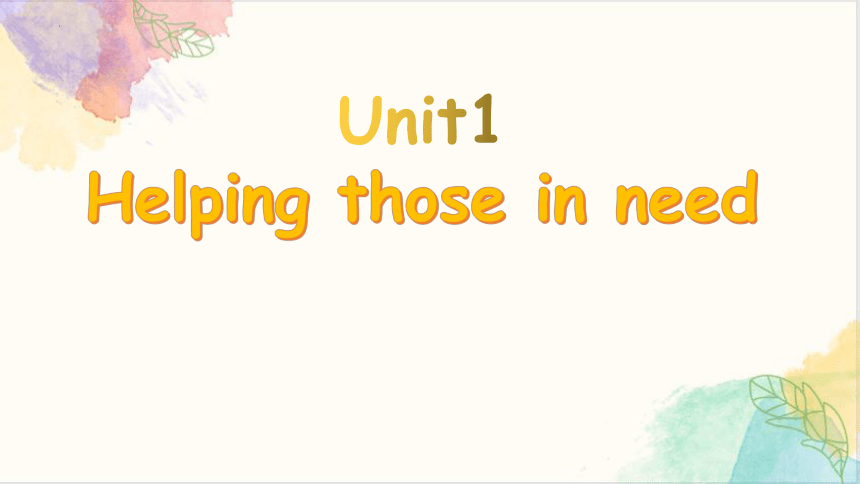
|
|
| 格式 | pptx | ||
| 文件大小 | 854.6KB | ||
| 资源类型 | 教案 | ||
| 版本资源 | 牛津深圳版 | ||
| 科目 | 英语 | ||
| 更新时间 | 2022-04-02 00:00:00 | ||
图片预览

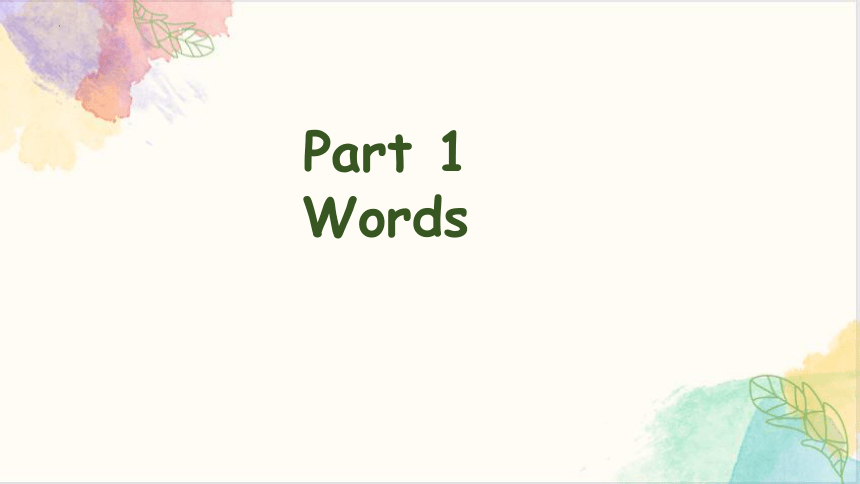
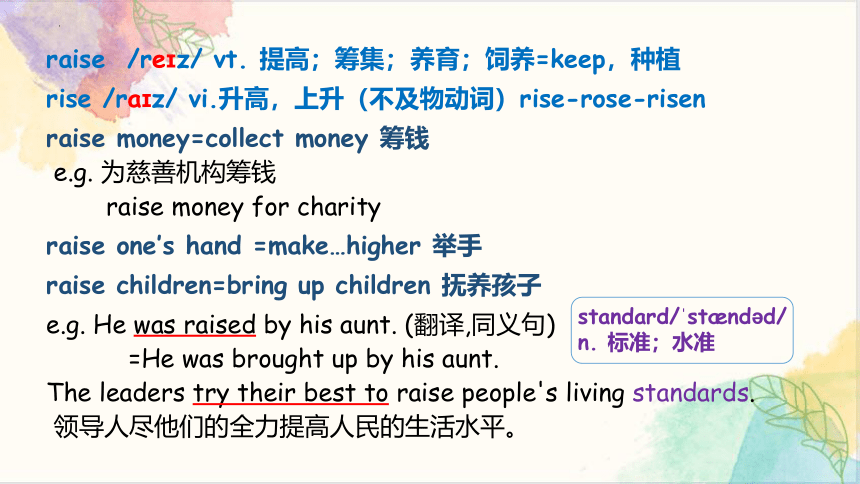
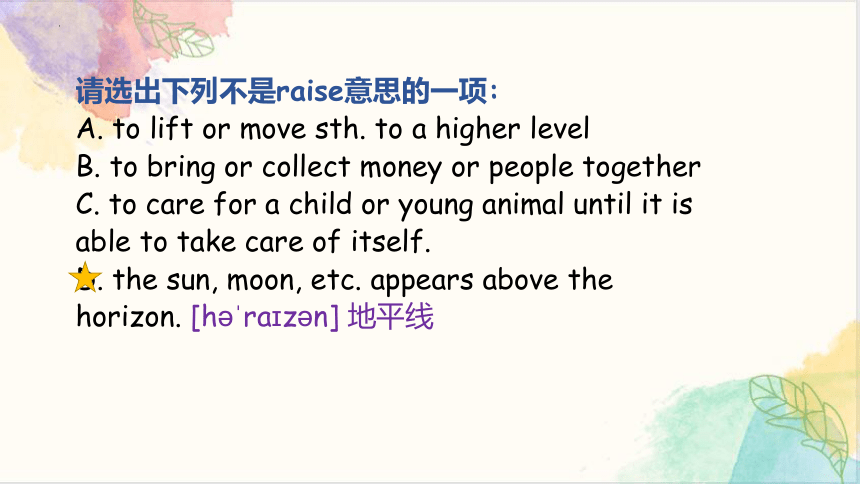
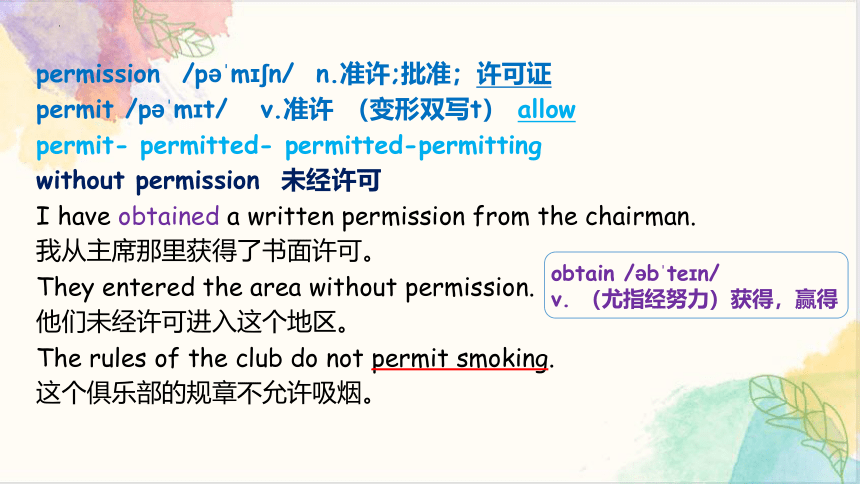
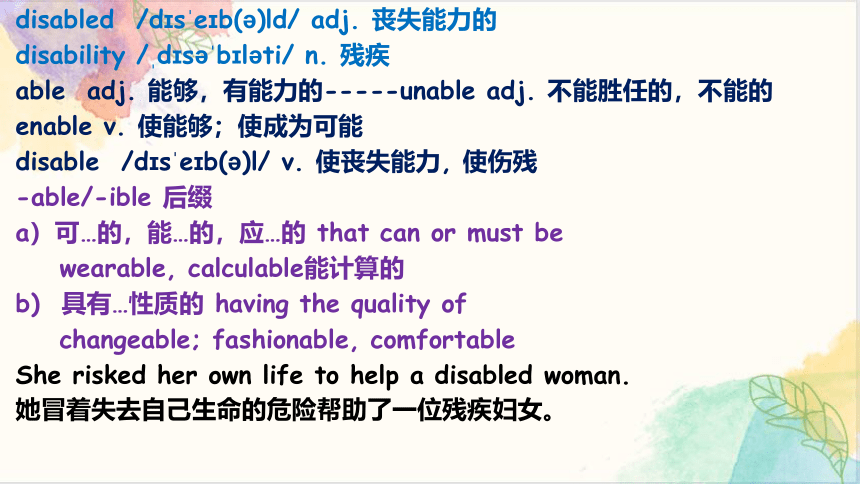
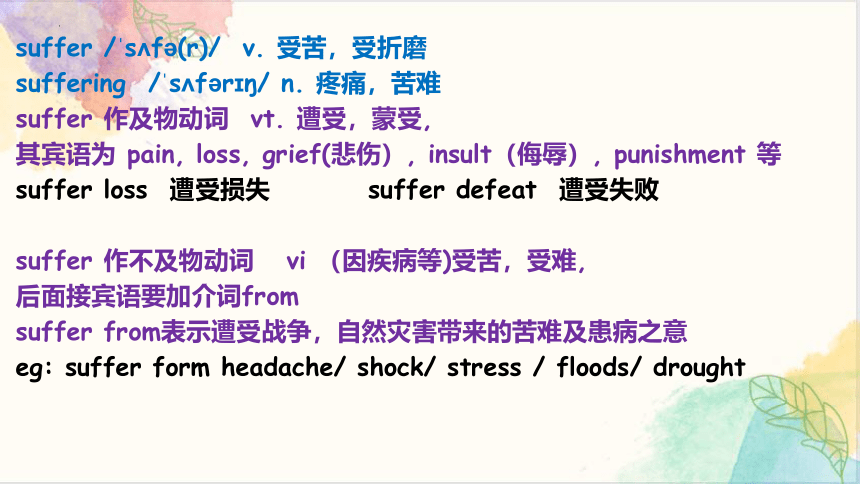
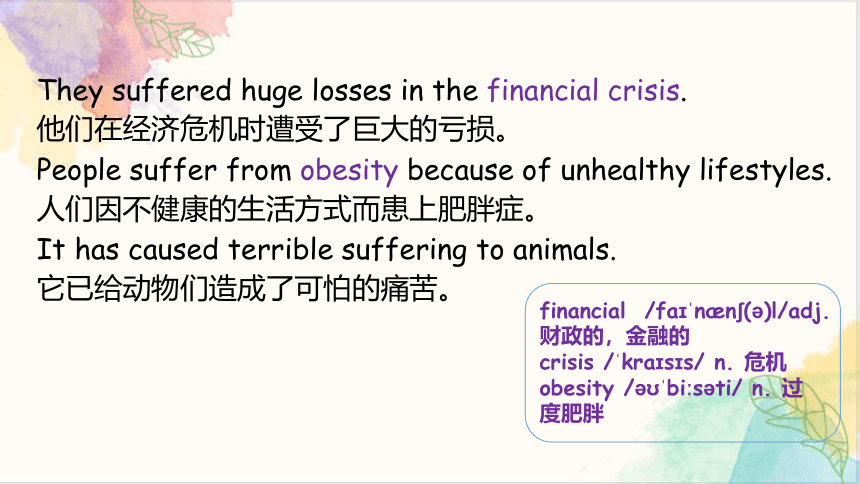
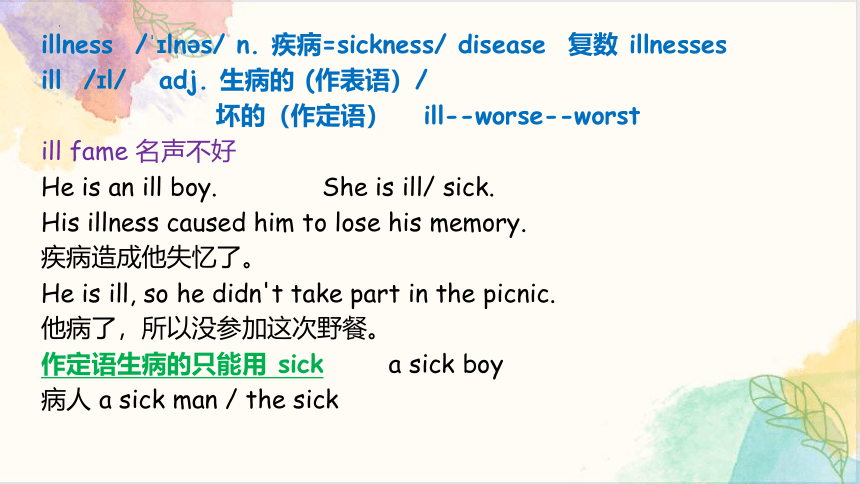
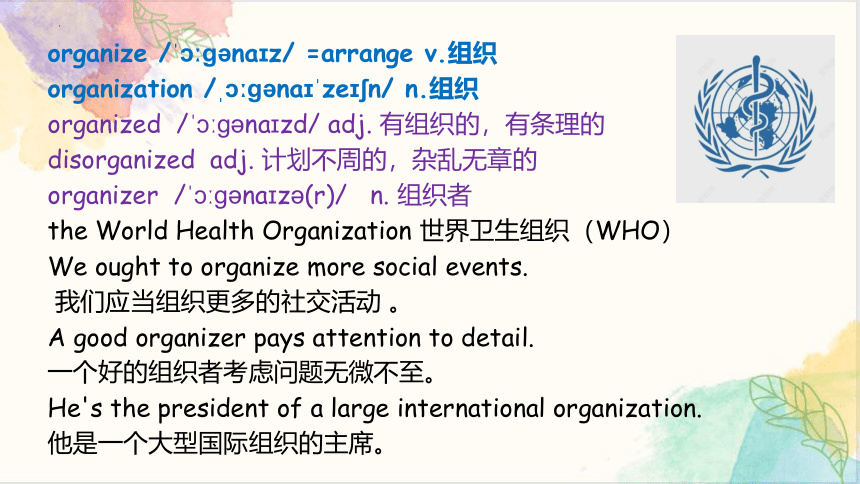
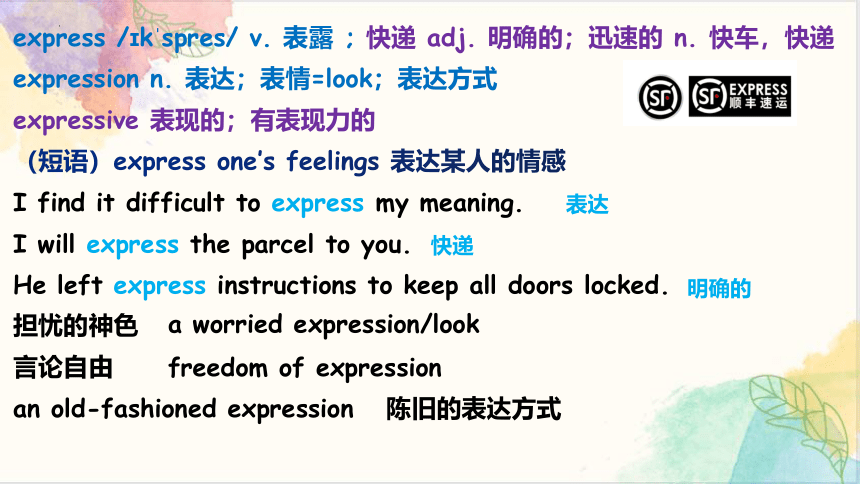
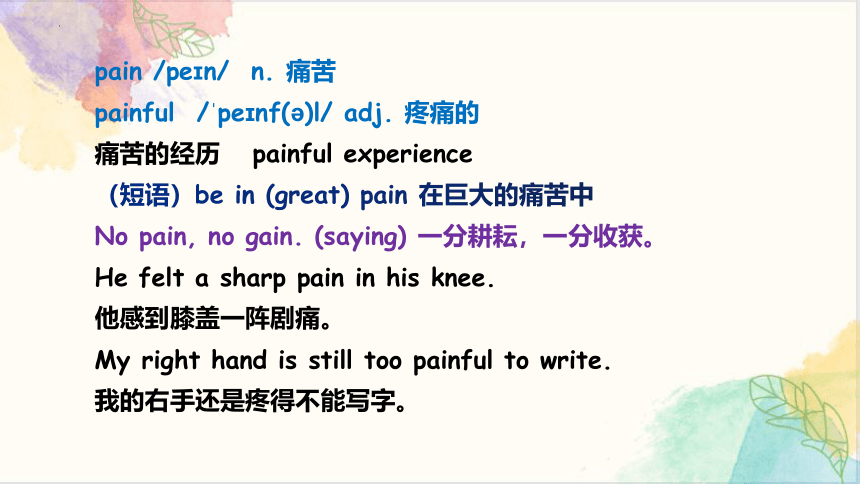
文档简介
(共54张PPT)
Unit1
Helping those in need
Part 1
Words
raise /re z/ vt. 提高;筹集;养育;饲养=keep,种植
rise /ra z/ vi.升高,上升(不及物动词)rise-rose-risen
raise money=collect money 筹钱
e.g. 为慈善机构筹钱
raise money for charity
raise one’s hand =make…higher 举手
raise children=bring up children 抚养孩子
e.g. He was raised by his aunt. (翻译,同义句)
=He was brought up by his aunt.
The leaders try their best to raise people's living standards.
领导人尽他们的全力提高人民的生活水平。
standard/ st nd d/
n. 标准;水准
请选出下列不是raise意思的一项:
A. to lift or move sth. to a higher level
B. to bring or collect money or people together
C. to care for a child or young animal until it is able to take care of itself.
D. the sun, moon, etc. appears above the horizon. [h ra z n] 地平线
permission /p m n/ n.准许;批准;许可证
permit /p m t/ v.准许 (变形双写t) allow
permit- permitted- permitted-permitting
without permission 未经许可
I have obtained a written permission from the chairman.
我从主席那里获得了书面许可。
They entered the area without permission.
他们未经许可进入这个地区。
The rules of the club do not permit smoking.
这个俱乐部的规章不允许吸烟。
obtain / b te n/
v. (尤指经努力)获得,赢得
disabled /d s e b( )ld/ adj. 丧失能力的
disability / d s b l ti/ n. 残疾
able adj. 能够,有能力的-----unable adj. 不能胜任的,不能的
enable v. 使能够;使成为可能
disable /d s e b( )l/ v. 使丧失能力, 使伤残
-able/-ible 后缀
a)可…的,能…的,应…的 that can or must be
wearable, calculable能计算的
b) 具有…性质的 having the quality of
changeable; fashionable, comfortable
She risked her own life to help a disabled woman.
她冒着失去自己生命的危险帮助了一位残疾妇女。
suffer / s f (r)/ v. 受苦,受折磨
suffering / s f r / n. 疼痛,苦难
suffer 作及物动词 vt. 遭受,蒙受,
其宾语为 pain, loss, grief(悲伤), insult(侮辱), punishment 等
suffer loss 遭受损失 suffer defeat 遭受失败
suffer 作不及物动词 vi (因疾病等)受苦,受难,
后面接宾语要加介词from
suffer from表示遭受战争,自然灾害带来的苦难及患病之意
eg: suffer form headache/ shock/ stress / floods/ drought
They suffered huge losses in the financial crisis.
他们在经济危机时遭受了巨大的亏损。
People suffer from obesity because of unhealthy lifestyles.
人们因不健康的生活方式而患上肥胖症。
It has caused terrible suffering to animals.
它已给动物们造成了可怕的痛苦。
financial /fa n n ( )l/adj. 财政的,金融的
crisis / kra s s/ n. 危机
obesity / bi s ti/ n. 过度肥胖
illness / ln s/ n. 疾病=sickness/ disease 复数 illnesses
ill / l/ adj. 生病的 (作表语)/
坏的(作定语) ill--worse--worst
ill fame 名声不好
He is an ill boy. She is ill/ sick.
His illness caused him to lose his memory.
疾病造成他失忆了。
He is ill, so he didn't take part in the picnic.
他病了,所以没参加这次野餐。
作定语生病的只能用 sick a sick boy
病人 a sick man / the sick
organize / ɡ na z/ =arrange v.组织
organization / ɡ na ze n/ n.组织
organized / ɡ na zd/ adj. 有组织的,有条理的
disorganized adj. 计划不周的,杂乱无章的
organizer / ɡ na z (r)/ n. 组织者
the World Health Organization 世界卫生组织(WHO)
We ought to organize more social events.
我们应当组织更多的社交活动 。
A good organizer pays attention to detail.
一个好的组织者考虑问题无微不至。
He's the president of a large international organization.
他是一个大型国际组织的主席。
express / k spres/ v. 表露 ; 快递 adj. 明确的;迅速的 n. 快车,快递
expression n. 表达;表情=look;表达方式
expressive 表现的;有表现力的
(短语)express one’s feelings 表达某人的情感
I find it difficult to express my meaning.
I will express the parcel to you.
He left express instructions to keep all doors locked.
担忧的神色
言论自由
an old-fashioned expression 陈旧的表达方式
表达
快递
明确的
a worried expression/look
freedom of expression
pain /pe n/ n. 痛苦
painful / pe nf( )l/ adj. 疼痛的
痛苦的经历 painful experience
(短语)be in (great) pain 在巨大的痛苦中
No pain, no gain. (saying) 一分耕耘,一分收获。
He felt a sharp pain in his knee.
他感到膝盖一阵剧痛。
My right hand is still too painful to write.
我的右手还是疼得不能写字。
lonely / l nli/ adj. 孤独的 n. loneliness 寂寞,孤独
alone adj.单独的,独自的;adv. 独自 =by oneself=on one's own
他独自居住,但他从未觉得孤独。
He lives alone, but he never feels lonely.
difficulty / d f k lti/ n. 困难=trouble difficult adj.
变形类似的有:honest/honesty
get into trouble 陷入困境
复习做某事有困难
I have difficulty (in) persuading her to leave.
我很难说服她离开。
persuade /p swe d/
v. 劝说;说服
joy /d / n. 愉快=happiness,delight
joyful / d fl/ adj. 快乐的=happy
to one's joy 令人高兴的是
There are tears of joy in her eyes.
她眼里含着喜悦的泪花。
Our graduation was such a joyful event.
我们毕业是件很高兴的事。
peace /pi s/ n. 平静
peaceful / pi sfl/ adj. 安宁的
诺贝尔和平奖
the Nobel Peace Prize
peaceable adj.不惹事的; 爱好和平的
The three leaders had worked out a peace plan.
3位领导人已制订出了一个和平方案。
We need a peaceful international environment.
我们需要一个和平的国际环境。
hurt /h t/ v. (使)疼痛 = injure (三式同形)
adj.(身体上/感情上)受伤的 n.心理创伤
hurt oneself 自己受伤
今天早上他伤到了腿。
This morning he hurt his legs.
She was deeply hurt that she had not been invited.
她未被邀请,感到十分受伤。
It was a hurt that would take a long time to heal.
那是需要很长时间才能愈合的创伤。
heal /hi l/
vt. 治愈,痊愈
courage / k r d / n. 勇气,勇敢=bravery
couragous /k re d s/ adj. 勇敢的 discourage v.阻止,使沮丧
encourage v. 鼓励 encouragement n. 鼓励
en-: 置于…之中,使成为
endanger 使遭遇危险 enlarge 扩大 enable 使能够
(短语) have the courage to do sth. 有勇气做某事
I admire him for his courage.
我佩服他的勇气。
The teacher encourages her students to study harder.
老师鼓励学生们要更加努力地学习。
pay-paid-paid /pe / v.付费,偿还;
n.工资,薪水=payment salary wage
pay for付钱 pay off 还清(债务)
pay attention to 注意 pay a visit to 去参观 ;拜访
He'll have to pay for what he has done.(v.)
他将为自己所做的一切付出代价。
Her job is hard work, but the pay is good. (n.)
她工作虽辛苦,但薪水不低。
voluntary 英/ v l ntri/ 美 / vɑ l nteri/
adj.自愿的;义务性的 (反)involuntary adj.非自愿的
(短语)voluntary work义务性工作
voluntary army
voluntary labor
voluntary service
He does some voluntary work at the local hospital.
他在当地医院从事一些义务性工作。
volunteer n.志愿者,自告奋勇者 v.自愿做 volunteer to do sth.
我昨天晚饭后自愿去洗碗。
I volunteered to wash the dishes after dinner last night.
志愿军
义务劳动
义务性服务
advice / d va s/ 不可数,a piece of advice
suggestion n.建议(可数)
advise v.建议 suggest 提议;暗示
change /t e nd / v. 改变 n. 零钱;变化
changeable adj.易变的,变化无常的
Computers have changed the way people work.
计算机改变了人的工作方式。
The weather was very changeable last winter.
去年冬天天气变化无常。
去上学改变了我的生活。 (课文句子)
Going to school changed my life.
Part 2
Phrases
be in need 需要帮助的
in need of 需要
be badly in need of 迫切需求;极其需要
His friend didn't help him when he was in need.
在他危急的时候,他的朋友没有帮助他。
He is badly in need of money.
他急需钱。
voluntary work 义务性工作
在将来我会继续做义务性工作。(课文句子)
I will continue to do voluntary work in the future.
ask permission 报请批准
permit sb. to do sth. 允许某人做某事 (allow)
=give sb. permission to do sth.
permit doing sth. 允许做某事=allow doing sth.
You must ask permission if you want to leave early.
如果你想早走的话,必须得到允许。
Her father would not permit her to eat candies.
她父亲不允许她吃糖果。
take part in 参加(活动)=join in join加入团体、组织
=participate /pɑ t s pe t/ in
suffer from 因…受苦;受折磨
那里的孩子都遭受严重的疾病。(课文句子)
The children there all suffer from serious illnesses.
express one's feelings 表达某人的情感
音乐是一种表达情感的好方式。
Music is a good way to express one’s feelings.
have difficulty (in) doing sth.做某事有困难
残疾儿童在行走或者移动方面有困难。
Disabled children have difficulty in walking or moving.
have the courage to do sth. 有勇气做某事
They do not have the courage to apologize for their behaviour.
他们没有勇气为自己的行为道歉。
in order to = so as to 为了,目的在于
in order to 放句首/句中 so as to 句中 (目的状语)
in order that = so that 为了;以便(目的状语)
so …that 如此... 以至于... (结果状语)
你必须讲大声一点这样每个人都可以听到。
You must speaker louder so that everyone can hear you.
in one’s free time 在某人的空闲时间
=in one's spare time
他空闲时间无事可做。
He has nothing to do in his spare time.
give sb. a hand 帮助某人=help sb.
= give sb. a favor
be in (great) pain 在巨大的痛苦中
She was in great pain and had to call the ambulance.
她处于极大的痛苦中,必须打电话叫救护车。
be serious/ s ri s/ about 对…认真
请认真对待你的作业。
Please be serious about your homework.
on purpose / p p s/ 故意
for the purpose of 为了…目的
I didn't hurt your pride on purpose. (n. 自豪;骄傲;自尊心)
我不是故意伤害你的自尊心。
A meeting was called for the purpose of raising money.
为筹钱而召开了一次会议。
take photos of 给…拍照 (take a photo)
would like to do sth. 想要做某事
= want to do sth.= feel like doing sth.
work as 担任…的工作
work on 对…起作用;继续工作;从事于…
work out 解决;算出;制定出;锻炼
He started to work as a security guard.
他开始工作时担任安保员。
have an interview with sb.= interview sb. 采访某人
Part 3
Grammar
1.Could you do sth 你能做某事吗?
Could 不表示过去式,而是表示委婉语气。
类似请求句型还有:
Would/ Will you please (not) do sth
(1) Could you give me a hand
你能帮我个忙吗?
(2) Would you please close the door
请您把门关上好吗?
2. offer sth. 提出某事
offer to do sth. 主动提出做某事
offer sb. sth.= offer sth. to sb. 主动给某人提供某物
provide sb. with sth. = provide sth. for sb. 为某人提供某物
(1) He offered to drive us to the airport.
他主动提出开车送我们去机场。
(2) I offer the poor man twenty yuan.
=
(3) They provided us with books.
=
I offer twenty yuan to the poor man.
They provided books for us.
3. alone & lonely
alone 形容词 作表语 单独的,独自的 指 形 体 上 的 单 副词 作状语 单独,独自地 独,独自一人
副词 作状语 单独,独自地 lonely 形容词 作表语或定语 孤独的,荒凉的 指精神上的孤单
(1) Her parents died in a car accident, and she is unhappy and very lonely.
她的父母在一起车祸中丧生,她很伤心,也非常孤独。
(2) I was travelling alone in the lonely mountains. I didn’t feel lonely though I was alone.
我独自行走在荒凉的山里。虽孤身一人,但我并不感到寂寞。
4. continue to do sth. 继续去做某事(去做另一件事)
continue doing sth. 继续做某事(同一件事)
=continue with sth. 使某事继续存在或不断发生
(1) After reading Lesson Nine,he continued to read Lesson Ten.
看完第9课,他接着去看第10课。
(2) He continued reading Lesson Ten .
他继续读第10课。
(3) You can continue with your work .
你可以继续工作。
5. have difficulty (in) doing sth. 做某事有困难
(difficulty 可用 problems 或 trouble 来代替)
(1) They have difficulty walking or moving.
他们行动困难。
(2) He has difficulty (in) solving the problem.
他解决这个问题有困难。
6. bring 从某处带来
take 将…带到另一处
get 去某处取回某物(一去一回)
(1) I taught them to sing because music can bring them joy and peace.
我教他们唱歌,因为音乐能给他们带来愉快和宁静。
(2) Don't forget to take an umbrella with you to school today.
今天上学别忘记带把雨伞。
(3) Can you get the book from the office for me
你能从办公室为我取来那本书吗?
7.raise one’s spirits 使振奋,使鼓起勇气
in high/low spirits 情绪高涨/低迷
/ sp r t/
(1) We need to help children like Tim and raise their spirits.
我们需要帮助像Tim这样的孩子,使他们鼓起勇气。
(2)If you are in high spirits, you have a good feeling.
如果你很兴高采烈,你是心情很好。
(3)I hope you can raise your spirits as soon as possible.
我希望你能尽快鼓起勇气。
8. in the future 将来
in future 从今以后=from now on
(1) I will continue to do voluntary work in the future.
在将来我会继续做义务性工作。
(2) He promises he will study hard in future.
他承诺从今以后会努力学习。
9.be in good health 身体健康,整个短语相当于 healthy。
be in bad/ poor health 身体不好
If you have an illness, you are a person in bad health.
如果你生病了,你的健康不好。
10.make+宾语+形容词,使…处于某种状态
(1) Miss Wang always makes her English classes interesting.
王老师总是使她的英语课很有趣。
(2) She doesn’t like the restaurant because the music there makes her sleepy.
她不喜欢那家餐馆,因为那里的音乐使她很困。
11. one of +名词/代词,作主语时,谓语动词用第三人称单数形式。
one of +the+形容词最高级+名词复数,最…之一
(1) One of my friends comes from Australia.
我的一位朋友来自澳大利亚。
(2) The Yellow River is one of the longest rivers in China.
黄河是中国最长的河流之一。
12.enjoy doing sth. 喜欢做某事
接动名词作宾语的还有:finish, practise, be worth, be busy, keep on, be used to, give up, consider, suggest, can’t help, feel like, miss, mind
enjoy oneself 过得高兴,玩得愉快=have a good time=have fun
(1) Joe enjoyed helping people.
Joe喜欢帮助别人。
(2) Did you enjoy yourself at the party last night
=Did you have a good time at the party last night
=Did you have fun at the party last night
昨晚你在晚会上玩得高兴吗?
13.in hospital 生病住院 in the hospital 在医院里
(1) Cindy is in hospital because she suffers from a serious illness.
Cindy 因为病得厉害而住院。
(2) My parents are in the hospital now.
现在我父母正在医院里。
14.use sth to do sth. = use sth. for doing sth. 用…来做…
(1) People use this machine to wash clothes.
=People use this machine for washing clothes
人们用这台机器洗衣服。
15.pay sb. some money for sth. 给某人钱买某物
sb. spend time/money on sth./sb. spend time/money (in) doing sth.
sth. cost sb some money =sb. pay money for sth.
It takes sb some time to do sth.
(1) I paid the bookseller 30 yuan for the book.
(2) She spent 30 yuan on the book.
(3) She spent 2 hours in watching TV.
(4) The book cost me 30 yuan.
(5) It took her 2 hours to watch TV.
(6) I paid 30 yuan for the book.
16.decide to do sth. 决定做某事= make a decision to do sth.
= make up one’s mind to do sth.
decide on sth. 决定某事 decide---decision (n.)
(1) We decided to meet Vivien today.
=_____________________________________
=_____________________________________
我们决定今天见Vivien.
(2) They decide on flying kites.
他们决定放风筝。
We made a decision to meet Vivien today.
We made up our mind to meet Vivien today.
17.feel 觉得;摸起来,系动词,后加形容词
(1)I feel lonely.
我感到孤独。
(2) The sweater feels soft.
这件毛衣摸起来柔软。
18. ask sb. to do sth. = tell sb. to do sth. 要求某人做某事
ask sb. (not) to do sth. = tell sb. (not) to do sth.
要求某人不要做某事
ask sb for sth. 向某人要某物
(1) He asked us to protect animals in danger.
他要求我们保护濒危动物。
(2) My mother asked me not to play on the road.
我妈妈叫我不要在路上玩。
(3) I asked the policeman for help yesterday.
我昨天向警察寻求帮助。
19.hope & wish
hope to do / hope that 从句
wish to do / wish that 从句/wish sb. to do sth.
(1) All the parents wish their children to be happy. (不能用 hope)
所有的父母都希望他们的孩子快乐。
(2) We hope to visit the beautiful beach.
我们希望去拜访那个漂亮的海滩。
20.think about 考虑,认为,表示“认为”=think of
think of 认为,想起 think over 仔细考虑
(1) I’m thinking about playing tennis.
我正在考虑打网球。
(2) The old picture made me think of my childhood.
那张旧照片使我想起了我的童年。
(3) Let me think it over.
让我仔细考虑一下。
21.基数词+percent of +名词,作主语,谓语动词的数取决于名词的数。
(1) Thirty percent of the students in our class walk to school.
我们班有30%的学生步行去上学。
(2) 70 percent of drinking water in China is from groundwater.
我们知道,在中国大约70%的饮用水来自地下水。
22.plan (planned, planned, planning) 计划
plan to do sth. 计划做某事
make a plan/make plans 制订计划
(1) They planned to collect soft drink cans and sell them .
他们计划收集软饮料罐来卖。
23.“某些名词+-less”构成形容词,表示否定意义,“无…的,不…的” homeless, hopeless, careless, sleepless, useless
24. 不定式的用法
不定式作宾语:不定式直接跟在谓语动词的后面。
如:want, need, learn, hope, wish, agree, fail, decide,
afford, offer, take turns, would like, plan, try one’s best 等
(1) My mother agrees to buy a pair of sports shoes for me.
我的妈妈同意给我买一双运动鞋。
买得起;负担得起
不定式作宾语补足语:ask, tell, would like, allow, encourage, warn, invite
作宾补时省略 to 的情况:let, make, have 和感官动词。 help 后可带 to,也可不带 to.
(1) She often invites us to take part in her party.
她经常邀请我们参与她的派对。
(2) They made him tell them everything.
他们让他把一切都告诉他们。
警告;提醒
不定式作状语
a) 表示目的:The doctor came to operate on her.
医生来给她做手术。
b) 表示结果:The girl cried to make her mother angry.
这女孩的哭让她妈妈很生气。
c) 表示程度:She is too tired to walk any farther.
她太累了再也不能往前走了。
d) 表示原因:I was surprised to read the news.
看到这个消息我很吃惊。
Thanks!
Unit1
Helping those in need
Part 1
Words
raise /re z/ vt. 提高;筹集;养育;饲养=keep,种植
rise /ra z/ vi.升高,上升(不及物动词)rise-rose-risen
raise money=collect money 筹钱
e.g. 为慈善机构筹钱
raise money for charity
raise one’s hand =make…higher 举手
raise children=bring up children 抚养孩子
e.g. He was raised by his aunt. (翻译,同义句)
=He was brought up by his aunt.
The leaders try their best to raise people's living standards.
领导人尽他们的全力提高人民的生活水平。
standard/ st nd d/
n. 标准;水准
请选出下列不是raise意思的一项:
A. to lift or move sth. to a higher level
B. to bring or collect money or people together
C. to care for a child or young animal until it is able to take care of itself.
D. the sun, moon, etc. appears above the horizon. [h ra z n] 地平线
permission /p m n/ n.准许;批准;许可证
permit /p m t/ v.准许 (变形双写t) allow
permit- permitted- permitted-permitting
without permission 未经许可
I have obtained a written permission from the chairman.
我从主席那里获得了书面许可。
They entered the area without permission.
他们未经许可进入这个地区。
The rules of the club do not permit smoking.
这个俱乐部的规章不允许吸烟。
obtain / b te n/
v. (尤指经努力)获得,赢得
disabled /d s e b( )ld/ adj. 丧失能力的
disability / d s b l ti/ n. 残疾
able adj. 能够,有能力的-----unable adj. 不能胜任的,不能的
enable v. 使能够;使成为可能
disable /d s e b( )l/ v. 使丧失能力, 使伤残
-able/-ible 后缀
a)可…的,能…的,应…的 that can or must be
wearable, calculable能计算的
b) 具有…性质的 having the quality of
changeable; fashionable, comfortable
She risked her own life to help a disabled woman.
她冒着失去自己生命的危险帮助了一位残疾妇女。
suffer / s f (r)/ v. 受苦,受折磨
suffering / s f r / n. 疼痛,苦难
suffer 作及物动词 vt. 遭受,蒙受,
其宾语为 pain, loss, grief(悲伤), insult(侮辱), punishment 等
suffer loss 遭受损失 suffer defeat 遭受失败
suffer 作不及物动词 vi (因疾病等)受苦,受难,
后面接宾语要加介词from
suffer from表示遭受战争,自然灾害带来的苦难及患病之意
eg: suffer form headache/ shock/ stress / floods/ drought
They suffered huge losses in the financial crisis.
他们在经济危机时遭受了巨大的亏损。
People suffer from obesity because of unhealthy lifestyles.
人们因不健康的生活方式而患上肥胖症。
It has caused terrible suffering to animals.
它已给动物们造成了可怕的痛苦。
financial /fa n n ( )l/adj. 财政的,金融的
crisis / kra s s/ n. 危机
obesity / bi s ti/ n. 过度肥胖
illness / ln s/ n. 疾病=sickness/ disease 复数 illnesses
ill / l/ adj. 生病的 (作表语)/
坏的(作定语) ill--worse--worst
ill fame 名声不好
He is an ill boy. She is ill/ sick.
His illness caused him to lose his memory.
疾病造成他失忆了。
He is ill, so he didn't take part in the picnic.
他病了,所以没参加这次野餐。
作定语生病的只能用 sick a sick boy
病人 a sick man / the sick
organize / ɡ na z/ =arrange v.组织
organization / ɡ na ze n/ n.组织
organized / ɡ na zd/ adj. 有组织的,有条理的
disorganized adj. 计划不周的,杂乱无章的
organizer / ɡ na z (r)/ n. 组织者
the World Health Organization 世界卫生组织(WHO)
We ought to organize more social events.
我们应当组织更多的社交活动 。
A good organizer pays attention to detail.
一个好的组织者考虑问题无微不至。
He's the president of a large international organization.
他是一个大型国际组织的主席。
express / k spres/ v. 表露 ; 快递 adj. 明确的;迅速的 n. 快车,快递
expression n. 表达;表情=look;表达方式
expressive 表现的;有表现力的
(短语)express one’s feelings 表达某人的情感
I find it difficult to express my meaning.
I will express the parcel to you.
He left express instructions to keep all doors locked.
担忧的神色
言论自由
an old-fashioned expression 陈旧的表达方式
表达
快递
明确的
a worried expression/look
freedom of expression
pain /pe n/ n. 痛苦
painful / pe nf( )l/ adj. 疼痛的
痛苦的经历 painful experience
(短语)be in (great) pain 在巨大的痛苦中
No pain, no gain. (saying) 一分耕耘,一分收获。
He felt a sharp pain in his knee.
他感到膝盖一阵剧痛。
My right hand is still too painful to write.
我的右手还是疼得不能写字。
lonely / l nli/ adj. 孤独的 n. loneliness 寂寞,孤独
alone adj.单独的,独自的;adv. 独自 =by oneself=on one's own
他独自居住,但他从未觉得孤独。
He lives alone, but he never feels lonely.
difficulty / d f k lti/ n. 困难=trouble difficult adj.
变形类似的有:honest/honesty
get into trouble 陷入困境
复习做某事有困难
I have difficulty (in) persuading her to leave.
我很难说服她离开。
persuade /p swe d/
v. 劝说;说服
joy /d / n. 愉快=happiness,delight
joyful / d fl/ adj. 快乐的=happy
to one's joy 令人高兴的是
There are tears of joy in her eyes.
她眼里含着喜悦的泪花。
Our graduation was such a joyful event.
我们毕业是件很高兴的事。
peace /pi s/ n. 平静
peaceful / pi sfl/ adj. 安宁的
诺贝尔和平奖
the Nobel Peace Prize
peaceable adj.不惹事的; 爱好和平的
The three leaders had worked out a peace plan.
3位领导人已制订出了一个和平方案。
We need a peaceful international environment.
我们需要一个和平的国际环境。
hurt /h t/ v. (使)疼痛 = injure (三式同形)
adj.(身体上/感情上)受伤的 n.心理创伤
hurt oneself 自己受伤
今天早上他伤到了腿。
This morning he hurt his legs.
She was deeply hurt that she had not been invited.
她未被邀请,感到十分受伤。
It was a hurt that would take a long time to heal.
那是需要很长时间才能愈合的创伤。
heal /hi l/
vt. 治愈,痊愈
courage / k r d / n. 勇气,勇敢=bravery
couragous /k re d s/ adj. 勇敢的 discourage v.阻止,使沮丧
encourage v. 鼓励 encouragement n. 鼓励
en-: 置于…之中,使成为
endanger 使遭遇危险 enlarge 扩大 enable 使能够
(短语) have the courage to do sth. 有勇气做某事
I admire him for his courage.
我佩服他的勇气。
The teacher encourages her students to study harder.
老师鼓励学生们要更加努力地学习。
pay-paid-paid /pe / v.付费,偿还;
n.工资,薪水=payment salary wage
pay for付钱 pay off 还清(债务)
pay attention to 注意 pay a visit to 去参观 ;拜访
He'll have to pay for what he has done.(v.)
他将为自己所做的一切付出代价。
Her job is hard work, but the pay is good. (n.)
她工作虽辛苦,但薪水不低。
voluntary 英/ v l ntri/ 美 / vɑ l nteri/
adj.自愿的;义务性的 (反)involuntary adj.非自愿的
(短语)voluntary work义务性工作
voluntary army
voluntary labor
voluntary service
He does some voluntary work at the local hospital.
他在当地医院从事一些义务性工作。
volunteer n.志愿者,自告奋勇者 v.自愿做 volunteer to do sth.
我昨天晚饭后自愿去洗碗。
I volunteered to wash the dishes after dinner last night.
志愿军
义务劳动
义务性服务
advice / d va s/ 不可数,a piece of advice
suggestion n.建议(可数)
advise v.建议 suggest 提议;暗示
change /t e nd / v. 改变 n. 零钱;变化
changeable adj.易变的,变化无常的
Computers have changed the way people work.
计算机改变了人的工作方式。
The weather was very changeable last winter.
去年冬天天气变化无常。
去上学改变了我的生活。 (课文句子)
Going to school changed my life.
Part 2
Phrases
be in need 需要帮助的
in need of 需要
be badly in need of 迫切需求;极其需要
His friend didn't help him when he was in need.
在他危急的时候,他的朋友没有帮助他。
He is badly in need of money.
他急需钱。
voluntary work 义务性工作
在将来我会继续做义务性工作。(课文句子)
I will continue to do voluntary work in the future.
ask permission 报请批准
permit sb. to do sth. 允许某人做某事 (allow)
=give sb. permission to do sth.
permit doing sth. 允许做某事=allow doing sth.
You must ask permission if you want to leave early.
如果你想早走的话,必须得到允许。
Her father would not permit her to eat candies.
她父亲不允许她吃糖果。
take part in 参加(活动)=join in join加入团体、组织
=participate /pɑ t s pe t/ in
suffer from 因…受苦;受折磨
那里的孩子都遭受严重的疾病。(课文句子)
The children there all suffer from serious illnesses.
express one's feelings 表达某人的情感
音乐是一种表达情感的好方式。
Music is a good way to express one’s feelings.
have difficulty (in) doing sth.做某事有困难
残疾儿童在行走或者移动方面有困难。
Disabled children have difficulty in walking or moving.
have the courage to do sth. 有勇气做某事
They do not have the courage to apologize for their behaviour.
他们没有勇气为自己的行为道歉。
in order to = so as to 为了,目的在于
in order to 放句首/句中 so as to 句中 (目的状语)
in order that = so that 为了;以便(目的状语)
so …that 如此... 以至于... (结果状语)
你必须讲大声一点这样每个人都可以听到。
You must speaker louder so that everyone can hear you.
in one’s free time 在某人的空闲时间
=in one's spare time
他空闲时间无事可做。
He has nothing to do in his spare time.
give sb. a hand 帮助某人=help sb.
= give sb. a favor
be in (great) pain 在巨大的痛苦中
She was in great pain and had to call the ambulance.
她处于极大的痛苦中,必须打电话叫救护车。
be serious/ s ri s/ about 对…认真
请认真对待你的作业。
Please be serious about your homework.
on purpose / p p s/ 故意
for the purpose of 为了…目的
I didn't hurt your pride on purpose. (n. 自豪;骄傲;自尊心)
我不是故意伤害你的自尊心。
A meeting was called for the purpose of raising money.
为筹钱而召开了一次会议。
take photos of 给…拍照 (take a photo)
would like to do sth. 想要做某事
= want to do sth.= feel like doing sth.
work as 担任…的工作
work on 对…起作用;继续工作;从事于…
work out 解决;算出;制定出;锻炼
He started to work as a security guard.
他开始工作时担任安保员。
have an interview with sb.= interview sb. 采访某人
Part 3
Grammar
1.Could you do sth 你能做某事吗?
Could 不表示过去式,而是表示委婉语气。
类似请求句型还有:
Would/ Will you please (not) do sth
(1) Could you give me a hand
你能帮我个忙吗?
(2) Would you please close the door
请您把门关上好吗?
2. offer sth. 提出某事
offer to do sth. 主动提出做某事
offer sb. sth.= offer sth. to sb. 主动给某人提供某物
provide sb. with sth. = provide sth. for sb. 为某人提供某物
(1) He offered to drive us to the airport.
他主动提出开车送我们去机场。
(2) I offer the poor man twenty yuan.
=
(3) They provided us with books.
=
I offer twenty yuan to the poor man.
They provided books for us.
3. alone & lonely
alone 形容词 作表语 单独的,独自的 指 形 体 上 的 单 副词 作状语 单独,独自地 独,独自一人
副词 作状语 单独,独自地 lonely 形容词 作表语或定语 孤独的,荒凉的 指精神上的孤单
(1) Her parents died in a car accident, and she is unhappy and very lonely.
她的父母在一起车祸中丧生,她很伤心,也非常孤独。
(2) I was travelling alone in the lonely mountains. I didn’t feel lonely though I was alone.
我独自行走在荒凉的山里。虽孤身一人,但我并不感到寂寞。
4. continue to do sth. 继续去做某事(去做另一件事)
continue doing sth. 继续做某事(同一件事)
=continue with sth. 使某事继续存在或不断发生
(1) After reading Lesson Nine,he continued to read Lesson Ten.
看完第9课,他接着去看第10课。
(2) He continued reading Lesson Ten .
他继续读第10课。
(3) You can continue with your work .
你可以继续工作。
5. have difficulty (in) doing sth. 做某事有困难
(difficulty 可用 problems 或 trouble 来代替)
(1) They have difficulty walking or moving.
他们行动困难。
(2) He has difficulty (in) solving the problem.
他解决这个问题有困难。
6. bring 从某处带来
take 将…带到另一处
get 去某处取回某物(一去一回)
(1) I taught them to sing because music can bring them joy and peace.
我教他们唱歌,因为音乐能给他们带来愉快和宁静。
(2) Don't forget to take an umbrella with you to school today.
今天上学别忘记带把雨伞。
(3) Can you get the book from the office for me
你能从办公室为我取来那本书吗?
7.raise one’s spirits 使振奋,使鼓起勇气
in high/low spirits 情绪高涨/低迷
/ sp r t/
(1) We need to help children like Tim and raise their spirits.
我们需要帮助像Tim这样的孩子,使他们鼓起勇气。
(2)If you are in high spirits, you have a good feeling.
如果你很兴高采烈,你是心情很好。
(3)I hope you can raise your spirits as soon as possible.
我希望你能尽快鼓起勇气。
8. in the future 将来
in future 从今以后=from now on
(1) I will continue to do voluntary work in the future.
在将来我会继续做义务性工作。
(2) He promises he will study hard in future.
他承诺从今以后会努力学习。
9.be in good health 身体健康,整个短语相当于 healthy。
be in bad/ poor health 身体不好
If you have an illness, you are a person in bad health.
如果你生病了,你的健康不好。
10.make+宾语+形容词,使…处于某种状态
(1) Miss Wang always makes her English classes interesting.
王老师总是使她的英语课很有趣。
(2) She doesn’t like the restaurant because the music there makes her sleepy.
她不喜欢那家餐馆,因为那里的音乐使她很困。
11. one of +名词/代词,作主语时,谓语动词用第三人称单数形式。
one of +the+形容词最高级+名词复数,最…之一
(1) One of my friends comes from Australia.
我的一位朋友来自澳大利亚。
(2) The Yellow River is one of the longest rivers in China.
黄河是中国最长的河流之一。
12.enjoy doing sth. 喜欢做某事
接动名词作宾语的还有:finish, practise, be worth, be busy, keep on, be used to, give up, consider, suggest, can’t help, feel like, miss, mind
enjoy oneself 过得高兴,玩得愉快=have a good time=have fun
(1) Joe enjoyed helping people.
Joe喜欢帮助别人。
(2) Did you enjoy yourself at the party last night
=Did you have a good time at the party last night
=Did you have fun at the party last night
昨晚你在晚会上玩得高兴吗?
13.in hospital 生病住院 in the hospital 在医院里
(1) Cindy is in hospital because she suffers from a serious illness.
Cindy 因为病得厉害而住院。
(2) My parents are in the hospital now.
现在我父母正在医院里。
14.use sth to do sth. = use sth. for doing sth. 用…来做…
(1) People use this machine to wash clothes.
=People use this machine for washing clothes
人们用这台机器洗衣服。
15.pay sb. some money for sth. 给某人钱买某物
sb. spend time/money on sth./sb. spend time/money (in) doing sth.
sth. cost sb some money =sb. pay money for sth.
It takes sb some time to do sth.
(1) I paid the bookseller 30 yuan for the book.
(2) She spent 30 yuan on the book.
(3) She spent 2 hours in watching TV.
(4) The book cost me 30 yuan.
(5) It took her 2 hours to watch TV.
(6) I paid 30 yuan for the book.
16.decide to do sth. 决定做某事= make a decision to do sth.
= make up one’s mind to do sth.
decide on sth. 决定某事 decide---decision (n.)
(1) We decided to meet Vivien today.
=_____________________________________
=_____________________________________
我们决定今天见Vivien.
(2) They decide on flying kites.
他们决定放风筝。
We made a decision to meet Vivien today.
We made up our mind to meet Vivien today.
17.feel 觉得;摸起来,系动词,后加形容词
(1)I feel lonely.
我感到孤独。
(2) The sweater feels soft.
这件毛衣摸起来柔软。
18. ask sb. to do sth. = tell sb. to do sth. 要求某人做某事
ask sb. (not) to do sth. = tell sb. (not) to do sth.
要求某人不要做某事
ask sb for sth. 向某人要某物
(1) He asked us to protect animals in danger.
他要求我们保护濒危动物。
(2) My mother asked me not to play on the road.
我妈妈叫我不要在路上玩。
(3) I asked the policeman for help yesterday.
我昨天向警察寻求帮助。
19.hope & wish
hope to do / hope that 从句
wish to do / wish that 从句/wish sb. to do sth.
(1) All the parents wish their children to be happy. (不能用 hope)
所有的父母都希望他们的孩子快乐。
(2) We hope to visit the beautiful beach.
我们希望去拜访那个漂亮的海滩。
20.think about 考虑,认为,表示“认为”=think of
think of 认为,想起 think over 仔细考虑
(1) I’m thinking about playing tennis.
我正在考虑打网球。
(2) The old picture made me think of my childhood.
那张旧照片使我想起了我的童年。
(3) Let me think it over.
让我仔细考虑一下。
21.基数词+percent of +名词,作主语,谓语动词的数取决于名词的数。
(1) Thirty percent of the students in our class walk to school.
我们班有30%的学生步行去上学。
(2) 70 percent of drinking water in China is from groundwater.
我们知道,在中国大约70%的饮用水来自地下水。
22.plan (planned, planned, planning) 计划
plan to do sth. 计划做某事
make a plan/make plans 制订计划
(1) They planned to collect soft drink cans and sell them .
他们计划收集软饮料罐来卖。
23.“某些名词+-less”构成形容词,表示否定意义,“无…的,不…的” homeless, hopeless, careless, sleepless, useless
24. 不定式的用法
不定式作宾语:不定式直接跟在谓语动词的后面。
如:want, need, learn, hope, wish, agree, fail, decide,
afford, offer, take turns, would like, plan, try one’s best 等
(1) My mother agrees to buy a pair of sports shoes for me.
我的妈妈同意给我买一双运动鞋。
买得起;负担得起
不定式作宾语补足语:ask, tell, would like, allow, encourage, warn, invite
作宾补时省略 to 的情况:let, make, have 和感官动词。 help 后可带 to,也可不带 to.
(1) She often invites us to take part in her party.
她经常邀请我们参与她的派对。
(2) They made him tell them everything.
他们让他把一切都告诉他们。
警告;提醒
不定式作状语
a) 表示目的:The doctor came to operate on her.
医生来给她做手术。
b) 表示结果:The girl cried to make her mother angry.
这女孩的哭让她妈妈很生气。
c) 表示程度:She is too tired to walk any farther.
她太累了再也不能往前走了。
d) 表示原因:I was surprised to read the news.
看到这个消息我很吃惊。
Thanks!
同课章节目录
